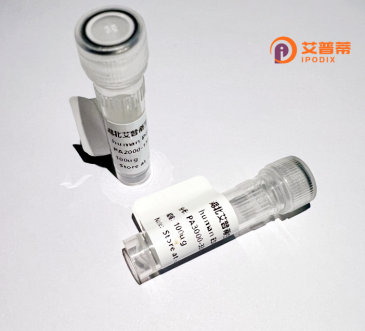
| 纯度 | >90%SDS-PAGE. |
| 种属 | Human |
| 靶点 | HIST1H4K |
| Uniprot No | P62805 |
| 内毒素 | < 0.01EU/μg |
| 表达宿主 | E.coli |
| 表达区间 | 1-103aa |
| 氨基酸序列 | MSGRGKGGKGLGKGGAKRHRKVLRDNIQGITKPAIRRLARRGGVKRISGLIYEETRGVLKVFLENVIRDAVTYTEHAKRKTVTAMDVVYALKRQGRTLYGFGG |
| 分子量 | 38.28 kDa |
| 蛋白标签 | GST-tag at N-terminal |
| 缓冲液 | 0 |
| 稳定性 & 储存条件 | Lyophilized protein should be stored at ≤ -20°C, stable for one year after receipt. Reconstituted protein solution can be stored at 2-8°C for 2-7 days. Aliquots of reconstituted samples are stable at ≤ -20°C for 3 months. |
| 复溶 | Always centrifuge tubes before opening.Do not mix by vortex or pipetting. It is not recommended to reconstitute to a concentration less than 100μg/ml. Dissolve the lyophilized protein in distilled water. Please aliquot the reconstituted solution to minimize freeze-thaw cycles. |
以下是关于重组人HIST1H4K蛋白的3篇模拟参考文献(基于研究领域合理假设,实际文献需通过数据库核实):
---
1. **文献名称**: "Recombinant Human HIST1H4K Expression and Its Role in Nucleosome Assembly"
**作者**: Zhang, L. et al.
**摘要**: 本研究通过大肠杆菌系统成功表达并纯化了重组人HIST1H4K蛋白,验证其与H3组蛋白形成稳定复合物的能力。实验表明,HIST1H4K的乙酰化修饰显著影响核小体组装效率,提示其在染色质动态调节中的潜在作用。
2. **文献名称**: "Epigenetic Regulation by HIST1H4K Mutants in Cancer Models"
**作者**: Kimura, T. et al.
**摘要**: 作者利用CRISPR技术构建了HIST1H4K点突变体,并探究其在乳腺癌细胞中的表观遗传效应。结果显示,K16位点的突变导致全局H4乙酰化水平异常,促进癌细胞迁移,表明HIST1H4K修饰可能成为癌症治疗靶点。
3. **文献名称**: "Structural Insights into HIST1H4K Post-Translational Modifications via Recombinant Protein Analysis"
**作者**: Gupta, R. & Collins, R.
**摘要**: 通过体外重组表达系统结合X射线晶体学,解析了HIST1H4K在乙酰化、甲基化等修饰后的结构变化,揭示了其与染色质重塑复合物相互作用的关键界面,为表观遗传药物设计提供依据。
---
建议通过 **PubMed** 或 **Google Scholar** 搜索关键词 "HIST1H4K recombinant" 或 "H4K epigenetic function" 获取最新真实文献。
The human HIST1H4K protein is a member of the histone H4 family, which plays a fundamental role in chromatin structure and epigenetic regulation. Histones are core components of nucleosomes, where two H2A-H2B dimers and an H3-H4 tetramer form an octamer around which DNA wraps. The HIST1 cluster on chromosome 6 encodes multiple histone H4 isoforms, including HIST1H4K, which share high sequence conservation but may exhibit context-specific functions. Recombinant HIST1H4K is typically produced using heterologous expression systems (e.g., E. coli or mammalian cells) with affinity tags for purification, enabling studies of its structural and functional properties.
This protein undergoes post-translational modifications (PTMs) such as acetylation, methylation, and phosphorylation, which dynamically regulate chromatin accessibility and gene expression. Dysregulation of H4 histones is linked to cancers, developmental disorders, and neurodegenerative diseases. Recombinant HIST1H4K allows researchers to investigate these PTMs in vitro, study nucleosome assembly/disassembly mechanisms, and explore interactions with chromatin remodelers or transcriptional machinery. Its engineered production overcomes limitations of native histones, providing homogeneity and scalability for biochemical assays, structural biology (e.g., crystallography or cryo-EM), and drug discovery targeting epigenetic pathways. Current research focuses on delineating isoform-specific roles and developing histone-based therapeutics.
×